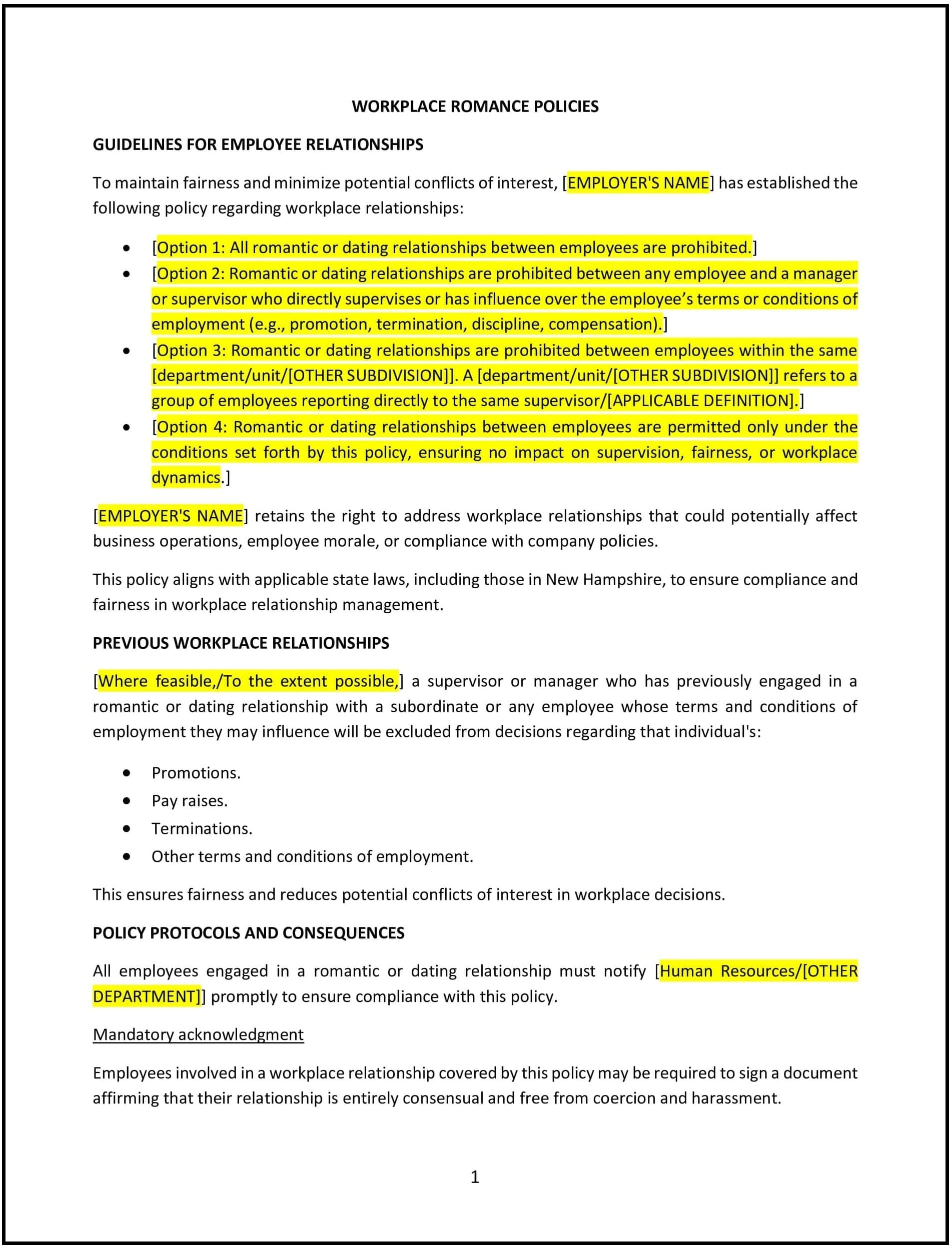Workplace romance policy (New Hampshire): Free template
Got contracts to review? While you're here for policies, let Cobrief make contract review effortless—start your free review now.

Customize this template for free
Workplace romance policy (New Hampshire)
A workplace romance policy helps New Hampshire businesses establish guidelines for managing romantic relationships between employees. This policy addresses potential conflicts of interest, power dynamics, and workplace disruption that may arise when employees enter into romantic relationships. It also sets clear expectations for behavior and provides a framework for addressing concerns in a fair and respectful manner.
By implementing this policy, businesses can maintain professionalism in the workplace while supporting employees’ right to personal relationships, ensuring that such relationships do not interfere with business operations or create uncomfortable work environments.
How to use this workplace romance policy (New Hampshire)
- Define workplace romance: Clearly define what constitutes a workplace romance, including romantic relationships, dating, or consensual personal relationships between employees at any level within the organization.
- Set expectations for behavior: Establish guidelines for professional conduct, emphasizing that romantic relationships should not interfere with work performance, team dynamics, or workplace decorum.
- Address conflicts of interest: Specify any conflicts of interest that may arise, such as relationships between supervisors and subordinates, and outline how these should be managed or avoided.
- Establish disclosure requirements: Outline when and how employees should disclose workplace romances, especially when one party has direct reporting responsibility over the other. This may include disclosing relationships to HR or management.
- Clarify non-retaliation provisions: Ensure that employees are not subjected to retaliation for disclosing a workplace romance and emphasize the company's commitment to maintaining a respectful and supportive work environment.
- Address potential issues: Provide guidelines for handling potential issues, such as complaints of favoritism, workplace gossip, or disruptions caused by a workplace romance.
- Provide steps for addressing conflicts: Define how conflicts of interest or disruptions resulting from workplace romances will be addressed, including potential reassignment, transfers, or mediation.
- Review and update: Periodically review and update the policy to ensure that it remains aligned with business needs, employee feedback, and any changes in state laws or company culture.
Benefits of using this workplace romance policy (New Hampshire)
This policy provides several benefits for New Hampshire businesses:
- Reduces workplace conflicts: By clearly addressing workplace romances and potential conflicts of interest, businesses can reduce the likelihood of disruptions, misunderstandings, and disputes in the workplace.
- Maintains professionalism: Establishing expectations for behavior ensures that workplace romances do not negatively affect the professional culture or the relationships between coworkers.
- Protects employees: The policy helps protect employees by providing a framework for handling workplace romances in a fair and consistent manner, reducing the risk of harassment, favoritism, or discrimination.
- Promotes transparency: A well-defined policy ensures transparency around the company's approach to workplace romances, encouraging employees to act in accordance with the organization's values and expectations.
- Mitigates legal risk: By addressing potential conflicts of interest and offering clear guidelines, businesses can minimize the legal risks associated with workplace romances, including claims of favoritism, discrimination, or harassment.
Tips for using this workplace romance policy (New Hampshire)
- Communicate the policy effectively: Make sure all employees are aware of the policy and understand its provisions, especially regarding the disclosure of workplace romances and the expectations for maintaining professionalism.
- Foster a respectful culture: Encourage employees to approach relationships with respect, professionalism, and consideration for the workplace dynamics.
- Address conflicts proactively: Address any concerns or conflicts early, whether related to perceived favoritism, distractions, or other potential issues arising from workplace romances.
- Ensure fair treatment: Enforce the policy consistently across all employees, regardless of their level or position within the company, to ensure fairness and avoid discrimination.
- Regularly review the policy: Periodically assess the policy to ensure that it aligns with company values, state laws, and industry standards.